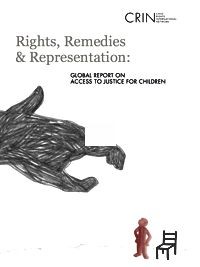Haiti Libre:
 |
In its latest report published Monday, February 15, Child Rights International Network (CRIN) ranks Haiti in 137th place worldwide out of 197 with a score of 103.5 points out of 261, on the ability of children to use the courts to defend their rights effectively.
The report, entitled “Rights, Remedies and representation” takes into account the ability of children to bring a case to court when their rights are violated, the resources that the legal system provides them with the practical considerations to take legal action, and if international law is or is not applicable in the national courts.
The ranking of states was developed by assigning a score to each country, under international standards regarding access of children to justice. These standards come from treaties ratified by the states, resolutions negotiated to the UN and the guidelines of the UN agencies. It is not a ranking of the success of states to protect the rights of the child, but on their ability to ensure children’s access to justice.
Haiti ratified the UN Convention on Children’s Rights (CRC) in 1994 which repeals all laws in conflict with it. However, there are no procedures or specific legal mechanisms for dealing with cases of violations of children’s rights. It does not exist for victims official legal aid system funded by the state. Impunity and corruption remain a problem in Haiti, leaving many government officials avoid responsibility. Lack of resources and financing contributing to congestion in the courts, and cases involving children are rarely considered a priority or taken seriously.
Note that in this report the Dominican Republic occupies the 16th place in the world rankings with a score of 185.5 points out of 261.
In the foreword of the report, Benyam Dawit Mezmur, President of the UN Committee on the Rights of the Child, writes “[…] Child rights standards in international instruments
do not mean much for the lived reality of children if they are not implemented. In particular, if the fundamental rights of children are violated, it is critical that children or those acting on their behalf have the recourse, both in law and in practice, to obtain a remedy to cease, prohibit and/or compensate for the violation.”
Download the report :
http://www.haitilibre.com/docs/crin_a2j_global_report_final_0.pdf
HL/ HaitiLibre